Unit 1 导学案
- 格式:doc
- 大小:90.00 KB
- 文档页数:2
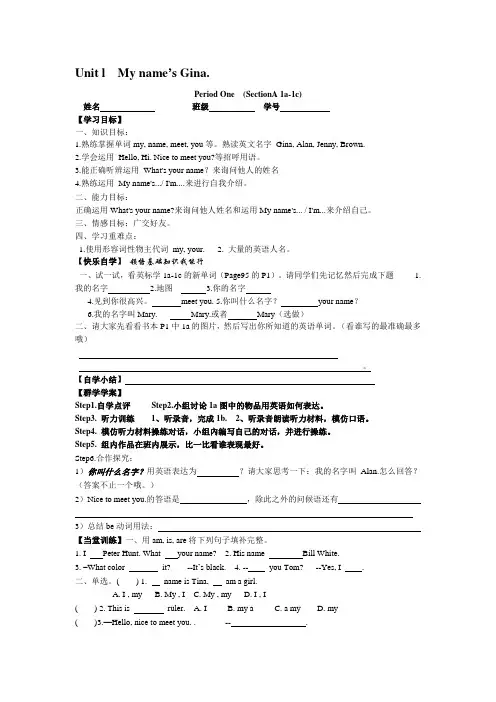
Unit l My name’s Gina.Period One (SectionA 1a-1c)姓名班级学号【学习目标】一、知识目标:1.熟练掌握单词my, name, meet, you等。
熟读英文名字Gina, Alan, Jenny, Brown.2.学会运用Hello, Hi. Nice to meet you?等招呼用语。
3.能正确听辨运用What's your name?来询问他人的姓名4.熟练运用My name's.../ I'm....来进行自我介绍。
二、能力目标:正确运用What's your name?来询问他人姓名和运用My name's... / I'm...来介绍自己。
三、情感目标:广交好友。
四、学习重难点:1.使用形容词性物主代词my, your.2. 大量的英语人名。
【快乐自学】领悟基础知识我能行一、试一试,看英标学1a-1c的新单词(Page95的P1)。
请同学们先记忆然后完成下题 1. 我的名字 2.地图 3.你的名字4.见到你很高兴。
meet you.5.你叫什么名字?your name?6.我的名字叫Mary. Mary.或者Mary(选做)二、请大家先看看书本P1中1a的图片,然后写出你所知道的英语单词。
(看谁写的最准确最多哦)。
【自学小结】【群学学案】Step1.自学点评Step2.小组讨论1a图中的物品用英语如何表达。
Step3. 听力训练1、听录音,完成1b. 2、听录音朗读听力材料,模仿口语。
Step4. 模仿听力材料操练对话,小组內编写自己的对话,并进行操练。
Step5. 组内作品在班内展示,比一比看谁表现最好。
Step6.合作探究:1)你叫什么名字?用英语表达为?请大家思考一下:我的名字叫Alan.怎么回答?(答案不止一个哦。
)2)Nice to meet you.的答语是,除此之外的问候语还有3)总结be动词用法:【当堂训练】一、用am, is, are将下列句子填补完整。
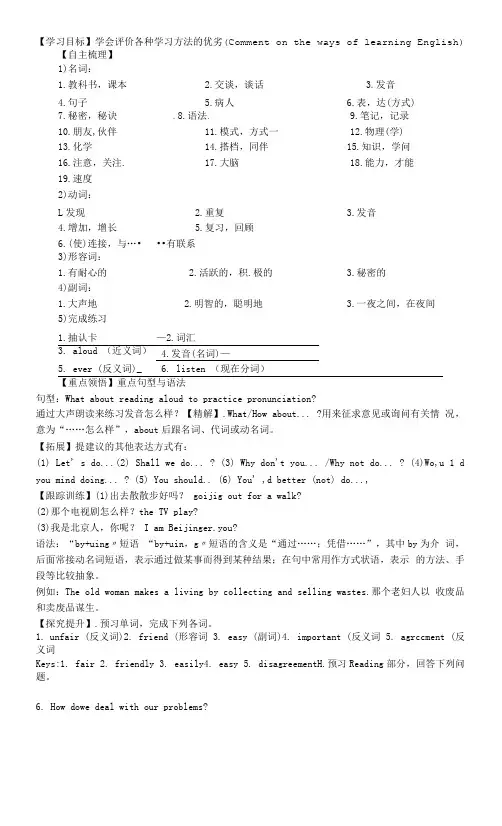
Unitl How can we become good learners ?,【学习目标】1.通过.交流和表达,进一步掌握学习英语的技巧与方法。
2.1.握下列知识点:单词.教科书,课本4.句子r ,7.秘密,秘诀重点短语:1.,通过制作单词卡片3.练习对话5.练习发音7.注意【自主梳理】预习单词,完成下列各词。
1.抽认卡 3. aloud (近义词)5. ever (反义词)7. study (过去分词)2.交谈,5.病人8.语法谈话3.发音6.表达(方式)9.笔记,记录2.4.6.2.向某人请求帮助4.爱上,喜欢上6.第一次8.犯错误词汇发音(名词)—listen (现在分词)(课本中查找答案)1.,2. 3. 4 5. 6. 7.【重点领悟】① How do you studyfor a test?语法:by+ V-ing的用法【探究提升】I.用所给单词的适当形式填空We studyby (work) with a1.It is a great way(1earn)②What about listening to tapes?3.W hat about (read) aloud n.根据汉语提示完成句子Have youever4.I study English group. a language.(practice) pronunciation and intonation?一(和朋友一起练习对话)friends?(通过制作)flashcards.6. (怎么样)listening to tapes?7.这个问题太难了,我理解不了。
It's hard m,e this question.8.朗读能提高你的口语。
-can your spoken English.Keys: 1. working 2. to learn 3.. Reading , preicticing 4. practiced witch friends5. by making 6. How about 7. too, for, to understand 8. Reading , improve.Unitl How can we become good learners ?【学习目标】学会评价各种学习方法的优劣(Comment on the ways of learning English) 【自主梳理】1)名词:1.教科书,课本2.交谈,谈话3.发音4.句子5.病人6.表,达(方式)7.秘密,秘诀.8.语法.9.笔记,记录10.朋友,伙伴11.模式,方式一12.物理(学)13.化学14.搭档,同伴15.知识,学问16.注意,关注. 17.大脑18.能力,才能19.速度2)动词:L发现 2.重复 3.发音4.增加,增长5.复习,回顾6.(使)连接,与…•••有联系3)形容词:1.有耐心的2.活跃的,积.极的3.秘密的4)副词:1.大声地2.明智的,聪明地3.一夜之间,在夜间5)完成练习1.抽认卡—2.词汇3. aloud (近义词)_4.发音(名词)—5. ever (反义词)_6. listen (现在分词)【重点领悟】重点句型与语法句型:What about reading aloud to practice pronunciation?通过大声朗读来练习发音怎么样?【精解】.What/How about... ?用来征求意见或询问有关情况,意为“……怎么样”,about后跟名词、代词或动名词。
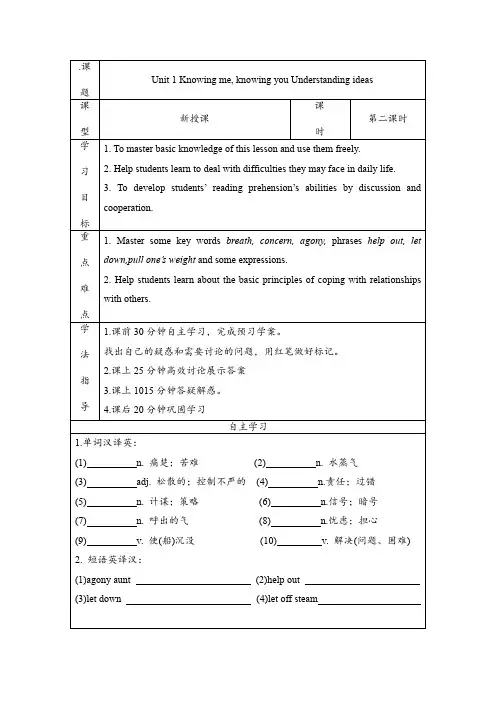
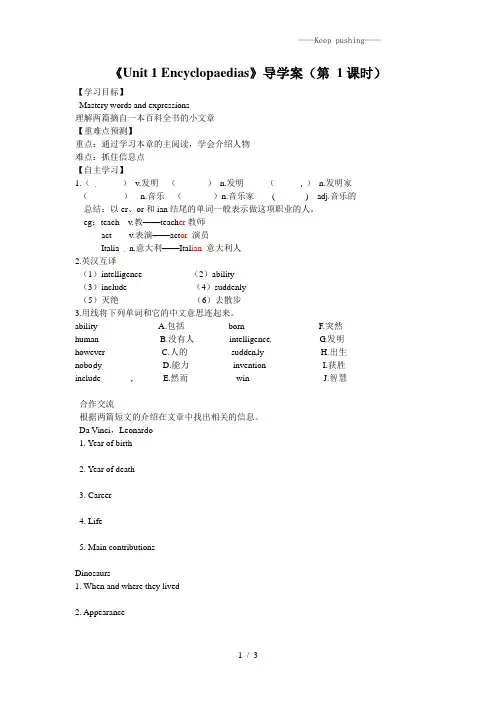
《Unit 1 Encyclopaedias》导学案(第1课时)【学习目标】Mastery words and expressions理解两篇摘自一本百科全书的小文章【重难点预测】重点:通过学习本章的主阅读,学会介绍人物难点:抓住信息点【自主学习】1.()v.发明()n.发明()n.发明家()n.音乐()n.音乐家( ) adj.音乐的总结:以er、or和ian结尾的单词一般表示做这项职业的人。
eg:teach v.教——teach er教师act v.表演——act or演员Italia n.意大利——Ital ian意大利人2.英汉互译(1)intelligence (2)ability(3)include (4)suddenly(5)灭绝(6)去散步3.用线将下列单词和它的中文意思连起来。
ability A.包括born F.突然human B.没有人intelligence G.发明however C.人的sudden ly H.出生nobody D.能力invention I.获胜include E.然而win J.智慧合作交流根据两篇短文的介绍在文章中找出相关的信息。
Da Vinci,Leonardo1. Year of birth2. Year of death3. Career4. Life5. Main contributionsDinosaurs1. When and where they lived2. Appearance3. Food4. Current situation理解重点词汇和句子be bornhuman beingin the countrysideas...asDa Vinci was born in the countryside.From the early age, he showed great intelligence and artistic and sc ience ability. Some dinosaurs were as small as chickens. Others were as big as ten elephants. Nobody knows why. However, we can learn about them from their fossils.五.效果反馈1.他和我一样高(as...as)2. When somebody i s born, he/she_______a. comes out of his/her mother’s bodyb. goes to see a doctorc. leaves his/her parents3. Benny’s grandparents live in th e countryside. They live ___ the city.a inside b. outside c. in the centre of4. The book includes some beautiful photos. These photos are ______ the book.a. part ofb. at the end ofc. connect ed of5. A human being i s a(n) ______.a. animalb. machinec. person6. Birds have a musical ability. They ____ sing.a. singb. cannotc. are happy to六.熟悉全文,掌握两篇短文中介绍的关键信息。
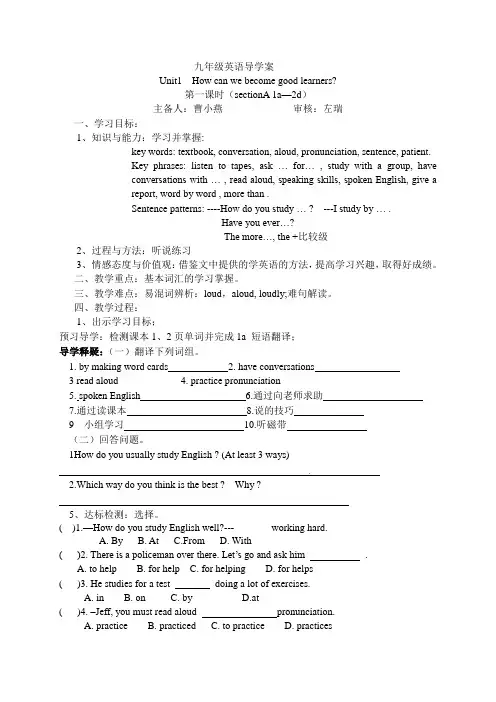
九年级英语导学案Unit1 How can we become good learners?第一课时(sectionA 1a—2d)主备人:曹小燕审核:左瑞一、学习目标:1、知识与能力:学习并掌握:key words: textbook, conversation, aloud, pronunciation, sentence, patient.Key phrases: listen to tap es, ask … for… , study with a group, haveconversations with … , read aloud, speaking skills, spoken English, give areport, word by word , more than .Sentence patterns: ----How do you study … ? ---I study by … .Have you ever…?The more…, the +比较级2、过程与方法:听说练习3、情感态度与价值观:借鉴文中提供的学英语的方法,提高学习兴趣,取得好成绩。
二、教学重点:基本词汇的学习掌握。
三、教学难点:易混词辨析:loud,aloud, loudly;难句解读。
四、教学过程:1、出示学习目标;预习导学:检测课本1、2页单词并完成1a 短语翻译;导学释疑:(一)翻译下列词组。
1. by making word cards2. have conversations3 read aloud ________ 4. practice pronunciation ________________5. spoken English6.通过向老师求助7.通过读课本8.说的技巧9 小组学习10.听磁带(二)回答问题。
1How do you usually study English ? (At least 3 ways)2.Which way do you think is the best ? Why ?5、达标检测:选择。
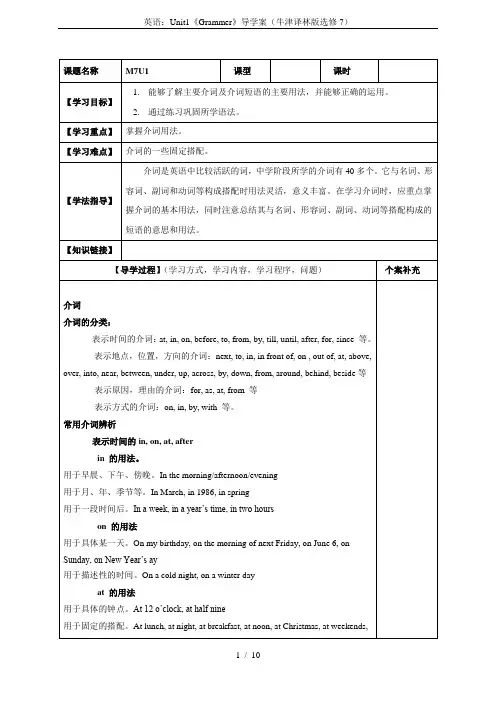
课题名称M7U1 课型课时【学习目标】1.能够了解主要介词及介词短语的主要用法,并能够正确的运用。
2.通过练习巩固所学语法。
【学习重点】掌握介词用法。
【学习难点】介词的一些固定搭配。
【学法指导】介词是英语中比较活跃的词,中学阶段所学的介词有40多个。
它与名词、形容词、副词和动词等构成搭配时用法灵活,意义丰富。
在学习介词时,应重点掌握介词的基本用法,同时注意总结其与名词、形容词、副词、动词等搭配构成的短语的意思和用法。
【知识链接】【导学过程】(学习方式,学习内容,学习程序,问题)个案补充介词介词的分类:1.表示时间的介词:at, in, on, before, to, from, by, till, until, after, for, since 等。
2.表示地点,位置,方向的介词:next, to, in, in front of, on , out of, at, above, over, into, near, between, under, up, across, by, down, from, around, behind, beside等3.表示原因,理由的介词:for, as, at, from 等4.表示方式的介词:on, in, by, with 等。
常用介词辨析1.表示时间的in, on, at, after1) in 的用法。
用于早晨、下午、傍晚。
In the morning/afternoon/evening用于月、年、季节等。
In March, in 1986, in spring用于一段时间后。
In a week, in a year’s time, in two hours2) on 的用法用于具体某一天。
On my birthday, on the morning of next Friday, on June 6, onSunday, on New Year’s ay用于描述性的时间。
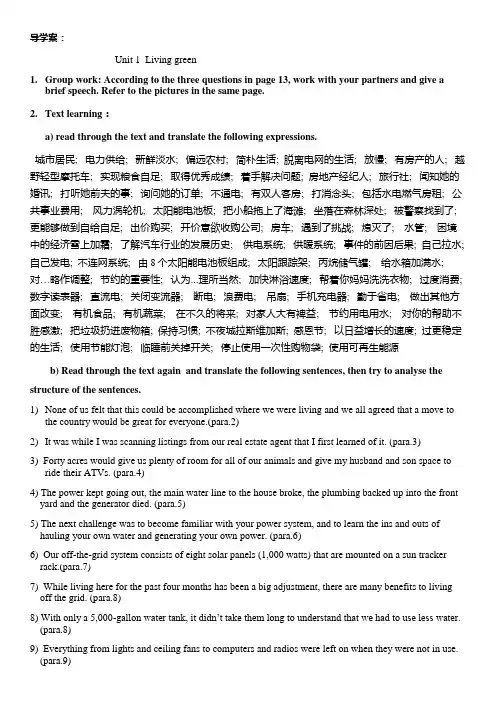
导学案:Unit 1 Living green1.Group work: According to the three questions in page 13, work with your partners and give abrief speech. Refer to the pictures in the same page.2.Text learning:a) read through the text and translate the following expressions.城市居民; 电力供给; 新鲜淡水; 偏远农村; 简朴生活; 脱离电网的生活; 放慢; 有房产的人; 越野轻型摩托车; 实现粮食自足; 取得优秀成绩; 着手解决问题; 房地产经纪人; 旅行社; 闻知她的婚讯; 打听她前夫的事; 询问她的订单; 不通电; 有双人客房; 打消念头; 包括水电燃气房租; 公共事业费用; 风力涡轮机; 太阳能电池板; 把小船拖上了海滩; 坐落在森林深处; 被警察找到了; 更能够做到自给自足; 出价购买; 开价意欲收购公司; 房车; 遇到了挑战; 熄灭了; 水管; 困境中的经济雪上加霜; 了解汽车行业的发展历史; 供电系统; 供暖系统; 事件的前因后果; 自己拉水; 自己发电; 不连网系统; 由8个太阳能电池板组成; 太阳跟踪架; 丙烷储气罐; 给水箱加满水; 对…略作调整; 节约的重要性; 认为…理所当然; 加快淋浴速度; 帮着你妈妈洗洗衣物; 过度消费; 数字读表器; 直流电; 关闭变流器; 断电; 浪费电; 吊扇; 手机充电器; 勤于省电; 做出其他方面改变; 有机食品; 有机蔬菜; 在不久的将来; 对家人大有裨益; 节约用电用水; 对你的帮助不胜感激; 把垃圾扔进废物箱; 保持习惯; 不夜城拉斯维加斯; 感恩节; 以日益增长的速度; 过更稳定的生活; 使用节能灯泡; 临睡前关掉开关; 停止使用一次性购物袋; 使用可再生能源b) Read through the text again and translate the following sentences, then try to analyse the structure of the sentences.1)None of us felt that this could be accomplished where we were living and we all agreed that a move tothe country would be great for everyone.(para.2)2)It was while I was scanning listings from our real estate agent that I first learned of it. (para.3)3) Forty acres would give us plenty of room for all of our animals and give my husband and son space toride their ATVs. (para.4)4) The power kept going out, the main water line to the house broke, the plumbing backed up into the front yard and the generator died. (para.5)5) The next challenge was to become familiar with your power system, and to learn the ins and outs of hauling your own water and generating your own power. (para.6)6) Our off-the-grid system consists of eight solar panels (1,000 watts) that are mounted on a sun tracker rack.(para.7)7) While living here for the past four months has been a big adjustment, there are many benefits to livingoff the grid. (para.8)8) With only a 5,000-gallon water tank, it didn’t take them long to understand that we had to use less water. (para.8)9) Everything from lights and ceiling fans to computers and radios were left on when they were not in use. (para.9)10) They include reducing the amount of trash we generate by recycling and composting, growing our ownorganic vegetables, and reusing and repurposing things that we would normally toss. (para.10)c) Understanding the Text:Text Organization (page 17)3.Finish the exercises from page 18 to 25 and they will be checked in class.4.Understand reading 1 & reading 2 and translate the following sentences.a) Reading 1:1) We were excited about the 5-week lifestyle experiment of living without a car in the suburbs of a major world city (Sydney, Australia), and getting the chance to better align our own actions with our values related to sustainability and health.2) Unfortunately, trains could only partly replace our car as the nearest station to our suburban household was morethan 3 miles away.3) Much of the way, there were bike lanes available, albeit lanes that were often full of debris or other obstacles.4) The good aspects of living without a car included having no car maintenance or car insurance, and not having to worry about break-ins, theft, or crashes.5) There were safety concerns with regard to cycling in traffic, being in strange train stations, and waiting at bus stops.6) We intend to continue our family’s efforts to live more sustainabl y, while simultaneously advocating for more supportive policies to reduce dependence on automobiles through initiatives such as additional bike lanes, walking paths, and better public transportation options.b) Reading 2:1) With nearly 4,000 Chinese companies manufacturing these devices, this relatively simple low-cost technology has leapfrogged into villages that do not yet have electricity.2) This technology is sweeping China like wildfire, already approaching market saturation in some communities.3) What is confusing is that while China has found a way to have an affordable price for these units and make them commonplace in China, it’s very rare to see a unit like this in America.4) Many of the residents there live in smaller city apartments and the idea of “suburbs” don’t exist. In addition, in the U.S. typically people have water tanks in their basements or garages instead of having a storage tank on the roof.5. Finish integrated skills practicing from page 32 to 35.。
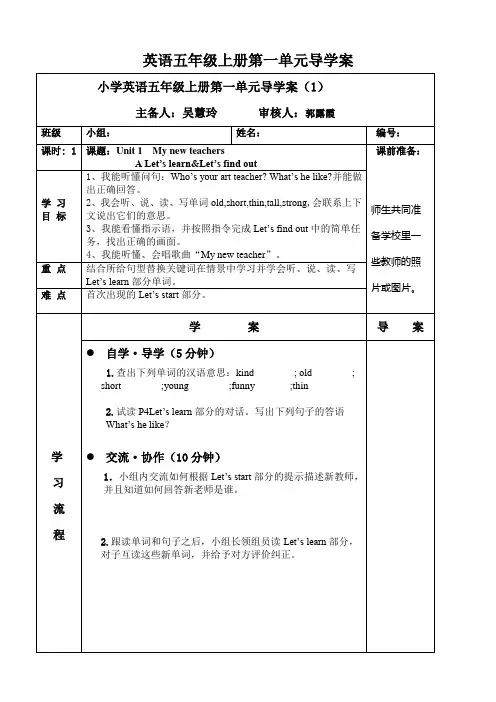
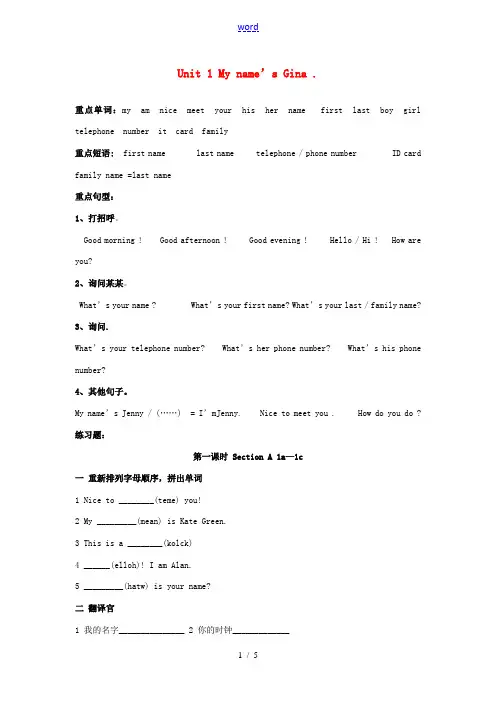
Unit 1 My name’s Gina .重点单词:my am nice meet your his her name first last boy girl telephone number it card family重点短语: first name last name telephone / phone number ID card family name =last name重点句型:1、打招呼。
Good morning ! Good afternoon ! Good evening ! Hello / Hi ! How areyou?2、询问某某。
What’s your name ? What’s your first name? What’s your last / family name?3、询问.What’s your telephone number? What’s her phone number? What’s his phone number?4、其他句子。
My name’s Jenny / (……) = I’mJenny. Nice to meet you . How do you do ?练习题:第一课时 Section A 1a—1c一重新排列字母顺序,拼出单词1 Nice to ________(teme) you!2 My _________(mean) is Kate Green.3 This is a ________(kolck)4 ______(elloh)! I am Alan.5 _________(hatw) is your name?二翻译官1 我的名字_______________2 你的时钟_____________3 见到你真高兴_____________________三单项选择( ) 1 ---- Good morning!----______________A ByeB Good morningC Good luck( ) 2 ----Hello, Ann! How are you?---- ________________A How are you?B Nice to meet youC Fine, thanks. ( ) 3 ---- Hi, Jenny! Nice to meet you!---- _______________________A YesB Nice to meet you, tooC Good morning ( ) 4 ----________, What’s your name?---- Mary JonesA HiB OhC OK四根据汉语完成句子1 你叫什么名字?________ ________ name?2 很高兴见到你。
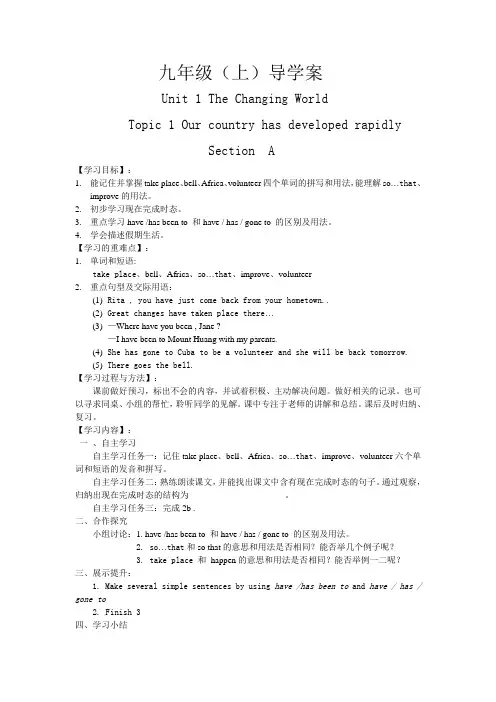
九年级(上)导学案Unit 1 The Changing WorldTopic 1 Our country has developed rapidlySection A【学习目标】:1.能记住并掌握take place、bell、Africa、volunteer四个单词的拼写和用法,能理解so…that、improve的用法。
2.初步学习现在完成时态。
3.重点学习have /has been to 和have / has / gone to 的区别及用法。
4.学会描述假期生活。
【学习的重难点】:1.单词和短语:take place、bell、Africa、so…that、improve、volunteer2.重点句型及交际用语:(1)Rita , you have just come back from your hometown..(2)Great changes have taken place there…(3)—Where have you been , Jane ?—I have been to Mount Huang with my parents.(4)She has gone to Cuba to be a volunteer and she will be back tomorrow.(5)There goes the bell.【学习过程与方法】:课前做好预习,标出不会的内容,并试着积极、主动解决问题。
做好相关的记录。
也可以寻求同桌、小组的帮忙,聆听同学的见解。
课中专注于老师的讲解和总结。
课后及时归纳、复习。
【学习内容】:一、自主学习自主学习任务一:记住take place、bell、Africa、so…that、improve、volunteer六个单词和短语的发音和拼写。
自主学习任务二:熟练朗读课文,并能找出课文中含有现在完成时态的句子。
通过观察,归纳出现在完成时态的结构为______________________。
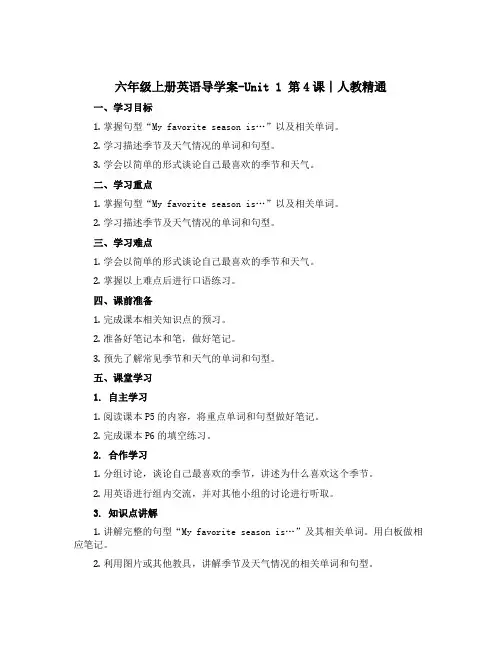
六年级上册英语导学案-Unit 1 第4课∣人教精通一、学习目标1.掌握句型“My favorite season is…”以及相关单词。
2.学习描述季节及天气情况的单词和句型。
3.学会以简单的形式谈论自己最喜欢的季节和天气。
二、学习重点1.掌握句型“My favorite season is…”以及相关单词。
2.学习描述季节及天气情况的单词和句型。
三、学习难点1.学会以简单的形式谈论自己最喜欢的季节和天气。
2.掌握以上难点后进行口语练习。
四、课前准备1.完成课本相关知识点的预习。
2.准备好笔记本和笔,做好笔记。
3.预先了解常见季节和天气的单词和句型。
五、课堂学习1. 自主学习1.阅读课本P5的内容,将重点单词和句型做好笔记。
2.完成课本P6的填空练习。
2. 合作学习1.分组讨论,谈论自己最喜欢的季节,讲述为什么喜欢这个季节。
2.用英语进行组内交流,并对其他小组的讨论进行听取。
3. 知识点讲解1.讲解完整的句型“My favorite season is…”及其相关单词。
用白板做相应笔记。
2.利用图片或其他教具,讲解季节及天气情况的相关单词和句型。
4. 个别练习1.独立完成课本P7的阅读训练。
2.完成课本P8的写作练习。
5. 知识巩固1.进行口语练习,互相交流最喜欢的季节和天气情况,并加以描述。
六、课后作业1.阅读课后操练的内容,加强自己的练习。
2.准备好课后单位的单词听写。
3.练习简单的口头交流,目标是谈论自己最喜欢的季节和天气情况。
以上为本节课的导学案,希望同学们认真阅读、积极配合,达到更好的学习效果。
Unit 1 How Tall Are You?教课方案【教材解析】六年级的学生正是好奇心极强的时候,对恐龙十分感兴趣,这课就是以谈论恐龙开篇的,所以我在课件中多加了几张恐龙动画片,把要点句型和词汇让恐龙说出来。
接着教材又用萨拉咨询埃米她穿多大号的鞋,这是学平生常生活中常有的。
【学生解析】我所带的两个六年班,学生整体素质二班比一班强一些,基础单薄是这两个班学生的共同之处,鉴于这一课开始学习比较级和最高等难度大,我准备这样设计教课环节和教课方法,完整让学生自己操作,多准备几个尺子和小称,亲身丈量,把要点句型使用多媒体屡次播放。
【教课内容】中心话题:咨询身旁的人或事物的年龄、身高、重量及长度并做比较。
语言功能:可以运用目口号进行身体或事物高矮、大小、重轻、长短进行描述和问答。
语言结构:1. 句型: 1.That ’s the tallest dinosaur in this hall.2.It ’s taller than both of us together.3.---How tall are you ?---I ’m 1.65 metres.4.What size are your shoes,Mike?5.Your feet are bigger than mine. My shoes are size 37.6.---How heavy are you?---I ’m 48 kilograms.2.词汇younger,older,taller,shorter,longer,thinner,heavier,bigger,smaller,strongerdinosaur,hall,metre,than,both,kilogram,countryside,lower,shadow,smarter,become【教课目标】[ 知识目标 ] 一、词汇younger,older,taller,shorter,longer,thinner,heavier,bigger,smaller,strongerdinosaur,hall,metre,than,both,kilogram,countryside,lower,shadow,smarter,become二、句型1.主语 +be 动词 +the+ 形容词最高等 +其余 . 2.A+ be 动词 +形容词比较级 +than+B.3.How+形容词 + be 动词 +主语?4.主语 + be 动词 +数字 +单位 / 其余 .5.What size + be动词+其余.三、四会句型1.That ’s the tallest dinosaur in this hall.2.It ’s taller than both of us together.3.---How tall are you ?---I ’m 1.65 metres.4.What size are your shoes,Mike?5.Your feet are bigger than mine. My shoes are size 37.6.---How heavy are you?---I ’m 48 kilograms.[ 能力目标 ]1.可以用形容词的比较级和最高等来谈论人或事物。
Unit 1 - Recycle 1 (导学案) 人教PEP版英语五年级上册一、学习目标1.理解和掌握单词recycle, waste, plastic, paper, metal, glass, cloth, cardboard的含义;2.学会发出和响应Can you help me?的请求;3.熟悉和掌握问候语和告别语。
二、学习重点和难点1.单词recycle, waste, plastic, paper, metal, glass, cloth,cardboard的词义;2.发出和响应请求Can you help me?;3.熟悉和掌握问候语和告别语。
三、学习内容1. 单词学习(1)recycle/recycle/ 是一个动词,意思是“回收利用”。
例如:We should recycle waste paper.(2)waste/waste/ 是一个名词,意思是“废物”。
例如:Don’t throw the waste on the ground.(3)plastic/plastic/ 是一个名词,意思是“塑料”。
例如:My schoolbag is made of plastic.(4)paper/paper/ 是一个名词,意思是“纸”。
例如:We write on paper.(5)metal/metal/ 是一个名词,意思是“金属”。
例如:The spoon is made of metal.(6)glass/glass/ 是一个名词,意思是“玻璃”。
例如:Be careful! The glass is easily broken.(7)cloth/cloth/ 是一个名词,意思是“布料”。
例如:My mom can make a dress with cloth.(8)cardboard/cardboard/ 是一个名词,意思是“纸板”。
例如:The box is made of cardboard.2. 情景对话(1)A: Can you help me?B: Yes, of course. A: Can you help me pick up the waste paper? B: Ok, let’s go.(2)A: Hello!B: Hello! A: How are you? B: I’m fine, thank you. And you? A: I’m good, too. Bye! B: Bye!四、学习要求1.记忆和理解新学单词的词义;2.理解和熟悉常用的问候语和告别语;3.通过配对、填空、朗读等多种形式来加深对所学内容的理解和记忆。
Unit1 My name’s Gina第一课时 (Section A 1a-1c )【学习目标】1、复习简单的问候语,运用Hello/Hi等打招呼,学会见面后的客套用语Nice to meet you.2、掌握单数物主代词的用法和基本句型“What's your name?”,并学会用其询问周围新同学的姓名。
3、能结合各知识点,围绕“初次见面”这一话题进行听、说、读、写训练。
增加同学间情感交流,培养学生团结同学的优良品德。
【重点难点】1.见面问候语:Hi / Hello! Good morning / Good afternoon / Good evening. How are you?I’m fine, thank you.Nice to meet you. Nice to meet you, too.2. 询问名字:What’s your name? My name is …/ I’m …【学习导航】一、复习回顾1.将26个字母按发音分类(写出与所给字母含有相同音素的其他字母)Aa_____________________Ee_____________________Ii_____________________Oo________________Uu____________Ff________________Rr_________2.我们在预备篇中学过的问候语和称呼,你还记得吗?①.嗨;你好___________________ ②早上好___________________③下午好___________________ ④晚上好___________________⑤你(身体)好吗?___________________ ⑥我很好,谢谢。
______________⑦见到你很高兴。
______________________二、预习感知:㈠英汉互译1.我的_______ ______3.好的,令人愉快的_______4.meet __________ 5你,你们_______ 6.什么_______ 7. your _________8.也,太________ 9. and __________ 10.他的________ 11.her ________㈡写出相应的全写形式’s= _____ ______2.I’m= ____ _____3.what’s= ____ ____4.i t’s = ____ ____三、合作探究1、你了解英文名字吗?英文姓名排列顺序为先名后姓,这和中国人先姓后名的排列顺序刚好相反。
八年级上册Unit 1 导学案Section A一、重点单词、短语、句型默写过关(课后组织默写)1、任何人2、在任何地方3、精彩的、绝妙的4、很少5、相当多6、最、最多、大部分7、某事、某物8、没有什么、没有东西9、每个人10、当然11、我自己12、你自己13、你们自己14、母鸡15、猪16、似乎、好像17、感到厌倦的、烦闷的18、某人19、日记,记事簿20、在度假21、待在家里22、去夏令营23、特别的东西24、见有趣的人25、有趣的事情26、打排球27、为考试学习28、和某人外出29、去有趣的地方30、拍照31、怎么样?好不好?32、大部分时间33、去购物34、唯一的问题35、写日记36、在农村37、上月我在度假38、大部分时间我待在家里看书和放松。
39、没有人在这里。
每个人都在度假。
40、所有东西尝起来真地很好。
41、晚上除了看书,没有什么事做。
42、为我自己买一些饮料或二、课文知识讲解1a-1c:词汇和短语(即背即写:在课堂上背记,课堂上默写)1、去度假2、去山里3、去海滩4、看望我的叔叔5、参观博物馆6、去夏令营7、待在家里8、度假9、过得愉快、玩得高兴10、优秀的,极好的2a-2d (一)词汇和短语(即背即写,课堂上背记,课堂上默写)1、Did you buy (特别的东西)for your father on Father’s Day ?2、Did Kevin (遇见有趣的人)?3、Did Julie (做了有趣的事情)?4、为考试学习5、和......一起出去6、好久不见。
7、Did you go (有趣的地方)?8、We (拍了相当多照片)last month.9、I (待)at home most of time (看书和放松). 10、大部分时间(二)不定代词:(somebody = someone某人、有人,something某事、某物,anybody=anyone 任何人、有人、某人,anything任何事物、某事、某物,nobody 没人,no one没人,nothing 没有东西,没有事情,everybody = everyone每个人,everything 每件东西,每件事情)1、不定代词都看成单数,做主语时,谓语一般用单数形式。
1.Look at the pictures and review.Then try to read them loudly.1.Listen and repeat2.Let’s know more about our new friends_________________________________________________________________________________________________________________________________________________________________________________________________________________________________________________________________1.Pronunciation:Help them find their friends_________________________________________________________________________________2.Listen and circle the sentences you hear.Then repeat them.3.Pay attention to the pronunciation of the contractions.4.2a Look and guess①Who are they in the photo?__________________________________________________________②Where are they ?__________________________________________________________③How do you think they feel ?__________________________________________________________ 5.2a Listen to the conversation and circle the words you hear.6.2b Read the conversation and answer the questions.①Who is Mr Smith ?A.Chen Jie’s class teacher.B. Chen Jie and Peter’s English teacher②What is Ms Gao’s first name ?A Hui B.Gao③Why did Peter make the mistake?______________________________________________________7.Read the conversation and complete the table with the information about Mr Smith and Peter.8.Listen again and pay attention to the pronunciation of who’s, I’m, he’s, and it’s. Then role-play the conversation.Complete the table with what you know about these students.Then introduce(介绍)them to your classmates.This is my new friend,__________(name).He/She’s in_____________(class).He/She’s from_____________(country).He/She’s _______________(age).His/Her class teacher is Mr/Ms_________.【参考答案】1.Listen and repeat略2.Let’s know more about our new friends1.Pronunciation:Help them find their friends2.Listen and circle the sentences you hear.Then repeat them.3.Pay attention to the pronunciation of the contractions.4.2a Look and guess①Who are they in the photo?They are a teacher and two students.Maybe they are classmates.②Where are they ?They are in the school.③How do you think they feel ?They look happy.5.2a Listen to the conversation and circle the words you hear.6.2b Read the conversation and answer the questions.①B ②A ③Because of cultural differences.(文化差异)7.Read the conversation and complete the table with the information about Mr Smith and Peter.8.Listen again and pay attention to the pronunciation of who’s, I’m, he’s, and it’s. Then role-play the conversation.一、请将下列单词按照其划线字母的读音归类。
第一课时Section A 1a-2d【课时重点】一、词汇1. work with friends 和朋友一起合作2. work with a group 小组合作3. make word cards制作单词卡片4. listen to the tap 听磁带5. ask sb. for help 向某人求助6. study for a test 为考试学习7. have conversations with sb. 和某人对话8. read aloud 大声朗读9. give a report 作报告10. learn a lot 学到很多11. a very slow reader 一个读书很慢的人12. get the main ideas 抓住主要意思13. that way =in that way 通过那种方式14. word by word 一词一个词15. be patient with sb. 对某人有耐心16. finish reading a book看完书二、句子1. --- How do you study for a test? 你怎样为考试而学习?--- I study by working with a group . 我通过小组合作来学习。
2. The more you read , the faster you’ll be . 你读得越多,你就读得越快。
3. You can become better by reading something you enjoy every day .你通过每天读一些拟喜欢的东西而变得更好。
4. It’s too hard to understand spoken English . 听懂英语口语太难了。
5. It takes time。
慢慢来。
别着急。
【合作探究】1. 表方式的by 。
by + doing 通过……方式如:by studying with a group2. ―大声地‖之意的aloud、loud、loudly① aloud,副词,出声能让人听见, 但声音不一定很大,,无比较级和最高级。
Unit 1 导学案 一、根据要求写出单词的正确形式
1. curly (反义词) ______________
2. pretty (反义词) ______________
3. fat (反义词) ______________
4. strong (反义词) ______________
5. loose (反义词) ______________
6. casual (反义词) ______________
7. light (反义词) ______________
8. common (近义词) ______________
9. simple (近义词) ______________ 10. look (n) (近义词) ______________ 11. serious (近义词) ______________
12. good-looking (近义词) ______________ 二、根据汉语意思将上下两行词结合为合成词
(部分单词可以重复使用)
1. 腿修长的 ______________
2. 衣着得体的 ______________
3. 红头发的 ______________
4. 相貌平平的 ______________
5. 看起来不整洁的 ______________
6. 体格健美的 ______________
7. 皮肤黝黑的 ______________
8. 脸圆圆的 ______________
9. 长袖的 ______________
10. 睁大眼睛的 ______________
三、根据图片写出对应的外貌特征相关词汇
1. ______________
2. ______________
3. ______________
4. ______________
5. ______________
6. ______________
7. ______________
8. ______________ 四、根据所给汉语或首字母提示,写出单词的正确形式
1. Her eyes are her best facial f .
2. What ’s the _____________ (平均的) height of your students?
3. She ’s got a beautiful slim _____________ (身材).
4. She ’s lost a lot of ____________ (体重) recently.
5. A different hairstyle can completely change your a .
6. She is more _____________ (有魅力的) in red.
7. These jeans _____________ (合身) me very well.
8. The blue tie really _____________ (适合) you. 9. The _____________ (心不在蔫的) look on her face implied boredom.
10. He looked at me with a(n) _____________ (茫然的) expression.
五、选出适当的单词或短语,并用其正确形式填空
1.The expectant mother (准妈妈) is five month ____________.
2. She sounded ____________ and worried.
3. A ____________ woman always makes her house spotlessly clean.
4. The aging lady was annoyed with more and
more ____________ around her eyes.
5. The pretty girl has ____________ hair and blue eyes.
6. You look ___________ in that suit. Are you going somewhere special?
7. They ____________ what the new neighbour would say.
8. Dad started going bald when he was ____________.
9. Tom has ___________ for lack of exercise.
10. The child __________ begged money
from the passers-by.
11. He is neither tall nor short — just
__________.
dark, long, red, ordinary, round, untidy, well, wide, build, dress, eye, face, hair, leg, look, skin, sleeve
wrinkle, smart, pregnant, neat, tense, fair, in rags, in one ’s thirties, of medium height, be curious about, put on weight
Unit 1 导学案答案
一、1. straight 2. ugly 3. thin / slim 4. weak 5. tight 6. formal
7. dark / heavy 8. ordinary 9. plain 10. appearance / expression 11. severe
12. beautiful / pretty / handsome / attractive
二、1. long-legged 2. well-dressed 3. red-haired 4. ordinary-looking 5. untidy-looking
6. well-built
7. dark-skinned
8. round-faced
9. long-sleeved 10. wide-eyed
三、1. uniform 2. beard 3. collar 4. pocket 5. glove 6. boot 7. belt 8. button
四、1. feature 2. average 3. figure 4. weight 5. appearance 6. attractive 7. fit 8. suits
9. absent / distant 10. blank
五、1. pregnant 2. tense 3. neat 4. wrinkles 5. fair 6. smart 7. were curious about
8. in his thirties 9. put on weight 10. in rags 11. of medium height。